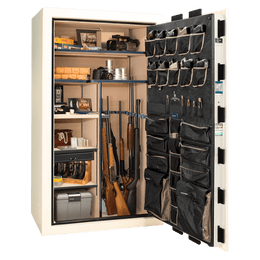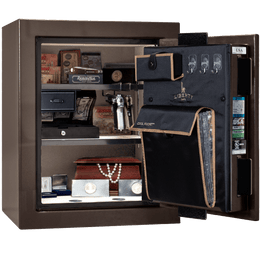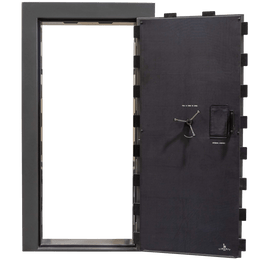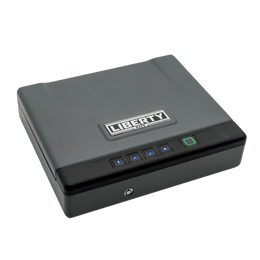Responsible gun owners or potential first-time firearm buyers often wonder what types of gun licenses or permits they need to obtain to stay legal. This article will cover the basics of the different types of firearm licenses and help you determine what you need to do to stay compliant with your local and federal laws and ordinances.
Please note: This article is for informational purposes only. While we have reasonably attempted to provide accurate information at the time of this publication, we are not lawyers or lawmakers. Neither Liberty Safe nor the author assumes any liability for using or misusing this information. Your responsibility is to learn and comply with all local, state, and federal firearms laws.
Different Types of Gun Licenses
Several different types of gun licenses may apply to you if you live in the USA. Some are individual licenses or permits that you may need to obtain for firearms purchase, ownership, possession, or concealed carry in your city or state. Some are federal licenses that you only need to worry about if you are wanting to become a Federal Firearm Licensed dealer (FFL), a firearms manufacturer, or are considering the purchase of any weapons regulated under the National Firearms Act. Under federal law, firearms ownership for non-prohibited persons (i.e., non-felons) does not require any permit or registration, except for specific weapons and items regulated under the NFA, such as machine guns, short-barreled shotguns, short-barreled rifles, gun silencers, destructive devices, and similar.
Which firearms are regulated under the NFA?
The following weapons are regulated under the National Firearms Act (NFA):
- A shotgun having a barrel or barrels of less than 18 inches in length;
- A weapon made from a shotgun if such weapon as modified has an overall length of less than 26 inches or a barrel or barrels of less than 18 inches in length;
- A rifle having a barrel or barrels of less than 16 inches in length;
- A weapon made from a rifle if such weapon as modified has an overall length of less than 26 inches or a barrel or barrels of less than 16 inches in length;
- Any other weapon, as defined in subsection (e);
- A machinegun;
- Any silencer (as defined in section 921 of title 18, United States Code); and
- A destructive device.
[26 U.S.C. 5845; 27 CFR 479.11]
To purchase normal firearms or ammunition from a licensed dealer (FFL), as far as the federal laws are concerned, legal, law-abiding citizens just need to be over the age of 18 for rifles and shotguns (and their ammunition), and over the age of 21 for handguns (and their ammunition). Under the Gun Control Act, FFLs are bound by these minimum age requirements established by the GCA, regardless of state or local law. In cases where state law or local ordinances establish a higher minimum age for purchasing or possessing firearms, the licensee must observe the higher age requirement.
Image: Types of Federal Firearms Licenses (FFL)
However, although federal law doesn’t require any special firearms license or permit to buy or own a gun, or even to make a firearm for your own use, many states and even individual cities and counties have enacted more restrictive firearms laws and ordinances that you need to be aware of. You are responsible for learning and following any and all local and state laws regarding the purchase, ownership, carry, and use of firearms where you live.
Let’s review some of the different types of firearms licenses that may apply to your situation.
General firearm ownership permits, state firearms purchase permits, Firearms Ownership Identification (FOID) Cards
Some states require residents to obtain a firearms ownership permit, purchase permit, or similar state license before buying, selling, or obtaining a firearm within the state. For example, California requires proof of state-mandated safety training before purchasing any firearm, while Washington requires it only for semi-automatic rifles.
Illinois requires that all Illinois residents obtain a Firearm Owners Identification (FOID) card, which is issued by the Illinois State Police to any qualified applicant, to possess firearms or ammunition legally. Remember, this is just to own or possess a firearm or ammunition in the state, and it does not give you the legal right to carry a concealed firearm (more on that below).
Image: Illinois Firearm Owners Identification (FOID) Card
Connecticut requires that a Certificate of Eligibility for Pistol and Revolvers, or Long Guns, or Ammunition be obtained before the purchase of handguns, long guns, or ammunition, respectively, or a State Permit to Carry Pistols and Revolvers be obtained before purchasing any of the above. Before issuing a certificate, applicants must complete an approved safety course and pass a National Instant Criminal Background Check System (NICS) background and mental health records check. Connecticut Certificates of Eligibility are granted on a may-issue basis to qualified applicants and are valid for five years. The state reserves the right to refuse a permit.
Image: Connecticut Certificate of Eligibility for Pistol and Revolvers, or Long Guns, or Ammunition
Other restrictive states have similar laws and permit requirements for purchasing or possessing firearms. Check with your local gun shop or city/state government’s website to see if your town or state requires any kind of license or permit for ownership, possession, or purchase of a firearm.
Concealed Carry Permits, CCW, Wear and Carry Permit, and License to Carry
Traditionally in the mid-to-late 20th century, many states required a specific Concealed Carry Weapon (CCW) permit if you wished to carry a handgun concealed on your person or even in a vehicle. These permits were issued on a shall issue (the state would issue a permit to any legal, non-prohibited person who applied) or may issue basis (where you would need to show a specific need for carrying a weapon or where a local sheriff who didn’t favor free citizens being armed could restrict the issuance of such permits). Some states still require that you obtain a CCW permit to carry a concealed weapon.
However, there is a growing trend of states that allow permitless carry, usually referring to carrying a handgun openly or concealed. As of May 1, 2023, 28 US states allow permitless firearm carry by any law-abiding person or, in one or two cases, specifically by residents of the particular state.
Many of these permitless carry states still issue Concealed Carry Weapon (CCW) permits that often allow legal carry in additional situations or locations that are prohibited to permitless citizens or which may be honored by other states requiring CCW permits for the legal carry of firearms. Typically, obtaining a CCW permit requires you to complete a rigorous state and federal background check, take a special training class, pay a fee, and potentially be fingerprinted before the state issues a permit. CCW permits must be renewed regularly, usually every three to five years.
State-specific requirements for gun licensing and permits
In some states, it’s perfectly legal for you to buy a handgun, rifle, or shotgun from another legal state resident in a private transaction without any permit or license (if you’re over the age of 21, are a legal citizen, and are not a felon or otherwise prohibited from firearm possession or ownership).
In other states, private firearms sales between individuals are prohibited or are only allowed with the involvement of a local FFL dealer and a state and/or federal background check. For example, for private party transfers (sales) of firearms between Colorado residents, the seller must request that an FFL perform a background check of the buyer and get prior approval of the transfer from the Colorado Bureau of Investigation. Transfers of antique firearms, bonafide gifts or loans from immediate family members, and transfers to estate executors or trustees are exempt.
More restrictive states may not allow concealed carry except in very specific and unique circumstances, and it may be impossible for regular people to obtain concealed handgun permits in places such as Chicago and New York. In places like Maryland, you must obtain a specific Wear and Carry Permit before legally wearing and carrying a regulated firearm, even for work.
Image: Maryland Handgun Wear and Carry Permit
Massachusetts has a similar state firearms law: Massachusetts residents 15 years and older who wish to possess, carry, and transport firearms, ammunition, and/or feeding devices must have a firearms license. Municipal police departments issue these firearms licenses (and you may or may not find that your municipality is amenable to providing these permits). Boston is notoriously stingy with allowing permits and has its own more restrictive license to carry for the city, which is extremely difficult and expensive to obtain, and which doesn’t actually give you the right to carry a firearm, but rather just to have a gun in your home and transport it to the shooting range.
California goes one further and has a state-approved roster of firearm models that can legally be purchased and owned in the state and prohibits the interstate purchase of ammunition by private citizens. Any resident of California who has not previously reported ownership of a firearm or anyone moving into California with a firearm is considered a personal firearm importer and must provide a report to the California Department of Justice (DOJ) regarding their firearm or must sell or transfer the firearm through a licensed dealer or to a sheriff or police department.
The California Department of Justice (DOJ) runs a background check. It retains information about the purchaser and seller of all in-state firearms sales and transfers, which must be completed through a dealer. A state permit to purchase, a background check, and a transaction report sent to the DOJ is required to buy a handgun. All ammunition purchases require a DOJ point-of-sale eligibility check with a $1 fee paid by the consumer.
We’ve mentioned several examples of more restrictive states that require specific firearms permits above, but for additional examples of states and cities that require municipality or state-issued permits for firearms purchase or ownership, including a list of states that have no restrictions on private firearms sales between individual residents, please refer to our full article, What do I need to purchase a gun?
How to Get a Gun License
The process for obtaining a gun license, and even whether you need to get one, will vary widely depending on where you live. We’ve discussed the general process for obtaining a concealed carry permit above, but for a purchase permit, you’ll have to check your local and state regulations, where applicable.
One of the best places to ask is often a local gun shop or shooting range. Ask a gun dealer in your area what is legally required in your location; they nearly always have a very good idea and can help you comply with the laws. City and state government websites also often have firearms laws FAQs or copies of relevant firearms laws, with links to the resources you may need to obtain the necessary training or permits in that locale.
Store your firearms in a Liberty Safe
Once you’ve obtained the proper training and permits for firearm purchase, possession, and carry (if required where you live), be sure to store all your firearms securely when they’re not in use. A Liberty gun safe or handgun vault is a great way to help prevent theft, damage, and unauthorized access to your firearms and ammunition (which is a legal requirement in some places). Check out our complete line of safes, vault doors, and handgun vaults in our online catalog, or stop by a local Liberty Safe showroom near you.
*Made in the U.S.A. from U.S. and Global Parts.







